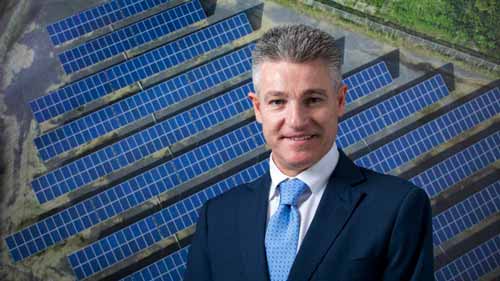
Madrid, December 29, 2019.
Ignacio Blanco has a degree in Law and was born in Palencia 47 years ago. He first worked in a law firm, then he made the jump to banking, but the decision that marked his life was the opening of a small solar and wind energy company called Enerpal, with which he was in charge of covering the needs of the renewable energy market until the slowdown caused by the crisis arrived and he had to leave the country to succeed in a photovoltaic sector that was sunk by the so-called sun tax. The nuclear accident in Fukushima made Japan change its energy policy and so Ignacio went to the land of the rising sun in search of a fortune that was denied to him in one of the countries with more hours of sunshine in Europe. He has been in Japan for seven years, is the president of the company Univergy and has returned to the same Spain that turned its back on him in search of new business options that depend, to a large extent, on a government that has been in office for too long.
The future of his company in Spain depends on the measures taken by a government in office. How do you experience these moments of uncertainty from a sector that depends so much on political decisions?
There is political will with the socialist government of Pedro Sánchez and the Ministry of Energy Transition, but it is clear that we have been with a government in office for too long. It’s not easy to regulate these kinds of issues when you’re in office. The big electricity companies were our enemies until very recently, but they have realized that this is unstoppable, that there is no going back, and they themselves have created their own divisions of renewables, of self-consumption, and are developing big plants. They have all entered – Endesa, Iberdrola and the former Gas Natural – and Orange has even entered the solar energy business. There is an obvious and very rapid energy transition in Spain. Coal and nuclear power plants are being closed, and what we thought two years ago was the future is now reality.
With the change in the energy model, many people have seen their way of life endangered. Do you plan to invest in areas where the process of decarbonisation has taken its toll, such as the north of the province?
In Palencia we have several projects. In Herrera and Grijota there are nine plants planned, which will begin to be built in 2021. In Spain, it takes between two and three years to build this type of large format plant. In Velilla we have been looking for land, but the owner of the plant has an advantage over us. There are many public areas and we are thinking of entering some competition or auction. I trust that all those people who depended on the plant can be relocated in the projects that may arise in the future, when a stable government is achieved.
Taking into account the particularities of the province of Palencia, is solar or wind energy more profitable?
Palencia is among the five best provinces in Spain for wind energy, but the right conditions for this type of installation are in the moors. Now they are repowering parks, which before were at 90 meters high and now they go to 140. Where before they got 2,500 hours of wind, now they get to 3,500 hours because at that altitude they get access to other types of winds. But this is in very specific areas because the wind is very capricious and is not stable in all parts of the province. The good thing about solar energy is that it is available everywhere. Spain is the great European power in solar energy and Palencia, too.
Last year he assured in an interview to this newspaper that renewable energies were going to make the electricity bill go down by 40% in five years. Are we going to leave the reduction for the end of the term?
The administrative procedures have not been speeded up yet. There are many plants in the pipeline for the next five years, but there is not much project executed. This will be moved by the law of supply and demand. When there is a lot of energy supply, the price will go down. There will come a time when there will be a surplus of energy and that 40% drop will come soon.
How do you make forecasts in a sector that changes so much?
It is certainly complicated to know what the future will be like, but the trends are clear and are the ones that do not lead to action in one direction or another. In fact, there are large solar installations in Spain that are beginning to be sized with batteries, even though the current cost of batteries would make the projects unfeasible. However, as the procedures take between two and three years to complete, by the time these plants are ready to be built, the price of the battery will have dropped so much that they will be profitable. In this sector we always work with an eye to the horizon.






